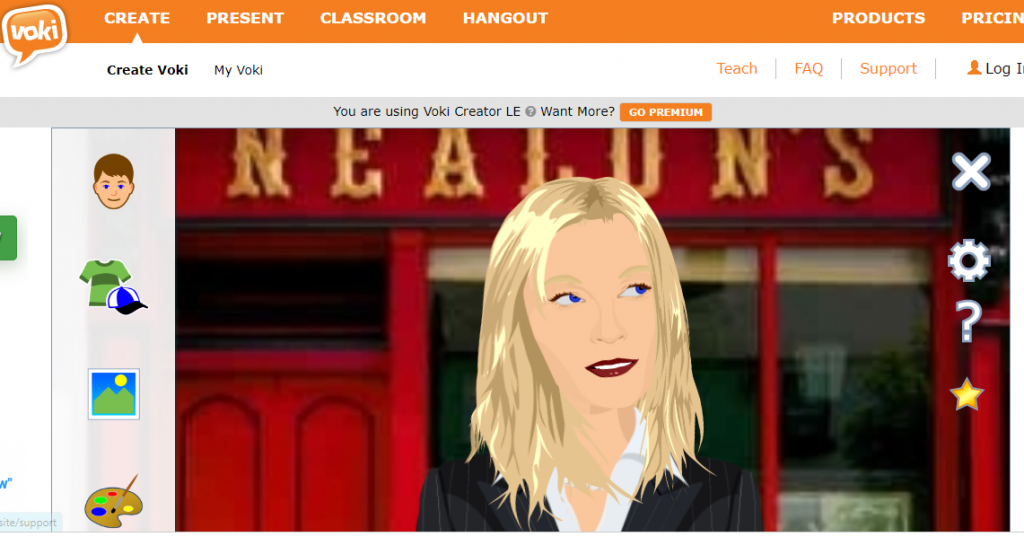Exploring Audio
This was so much fun! I tried out each of the apps listed, out of curiosity. I know very little about audio recording, so I have a lot to learn. Why not start now? I won’t talk about each of them, but will try to differentiate them, as some of them were very similar.
First I checked out Voki. I was expecting a simple audio recorder button and maybe an editing tool, but instead, when I chose to “Create Voki” I found fun tools that I used to create an avatar that looked pretty similar to me! You can spend time changing hair, clothing, backgrounds, eyes and lips, and more. After you personify your voice, you can choose to enter text to be read, record audio through your computer microphone, or upload an audio file. I chose to type and have it read to me. While reading, the avatar will move its mouth to read the text, so I immediately thought of our elementary students really getting a kick out of having a digital personality of their own to read their writings. Here is a screenshot of what “I” look like:

I had fun with Voki. After reading the blog post in Edutopia (King, 2016), I could envision students using this tool to hear their written works read back to them in another voice for revision purposes, or even their own recorded voice as a safe place to listen to an oral presentation. As King (2016) mentioned, audio recording can be a practice space for revision, self-assessment, and a boost of confidence.
Vocaroo, another audio recording site, has the same idea, just much simpler. When you log in, you see only the record button. I pressed it and started talking. This is my very basic review of this very basic (and not in a bad way) site: https://voca.ro/1iQrHYng0lFD
AudioPal, much like Voki, offers a choice of Text-to-Voice, audio recording, or audio file uploading. Also like Voki, some words, if typed out, are best pronounced when spelled phonetically. For example, I wanted to say “re-CORD” but it was read back as “Reh-curd”, as in an album. A little tweaking created an easy fix.
SpeakPipe and Clyp seemed very specific to podcasting and high-quality music recording, respectively. They both seem like professional quality sites that may well beyond the scope of what my elementary students would use, but I could certainly envision upper grade level students creating a podcast as a means of presenting a research paper or unconventional presentation.
Online Voice Recorder is also a recording site that you can use in your browser, or as an extension for Chrome. It saves your recordings as an mp3 and one of the key features that I noticed is the privacy policy. Since recordings are not uploaded to a server, they are only accessible to the creator and therefore are completely private. Their editing options are basic but cropping and audio silence trimming would be useful and seem easy to use.
I had a ton of fun writing a song on the MusicLab site! I opened the site and chose the Song Maker and in a few clicks of the mouse, created this masterpiece that I am calling “Sandbox 4”. https://musiclab.chromeexperiments.com/Song-Maker/song/4664866891890688
Based on research of the use of audio recordings to boost literacy, comprehension, vocabulary, and pronunciation, among other things, in children, I fully expect the uses to continue to present themselves beyond podcasts and presentations (Chimes Radio, 2022).
In addition to all the audio fun I had, I listened to a compelling podcast about financial matters geared to preteens and teens. “Million Bazillion” is produced by Minnesota Public Radio and is pretty clever, in my opinion, in discussing money matters. I listened to Negotiation is a super important skill (Bodnar, 2020) which explores pre-teen Ruby’s mission to convince her parents that she needs a new cell phone. The hosts of the podcast, along with a special guest who is a mediation expert and law professor, gave Ruby some expert negotiating tips and strategies for working with her parents to find common ground. I appreciate that the hosts spoke to Ruby in a mature tone and gave her strategies that she can use in the future. I can imagine their other episodes would offer a lot of the same sound financial advice.
References
Bodnar, B., & Perez, R. (2020, July 28). Negotiation is a super important skill. Million Bazillion. https://www.marketplace.org/shows/million-bazillion/negotiation-is-a-super-important-skill/
Chimes Radio. (2022). Why audio content is best for kids? BlueBall Media and Entertainment. https://chimesradio.com/parenting-blogs/why-audio-content-is-best/
King, M. (2016, July 18). 4 ways audio recording can boost classroom learning. Edutopia. https://www.edutopia.org/discussion/4-ways-audio-recording-can-boost-classroom-learning.
Thomas, S. (2022). Sandbox 4. https://musiclab.chromeexperiments.com/Song-Maker/song/4664866891890688
I also really loved the Chrome Music Lab! I had so much fun playing around with it.
This is a very well-done blog post. I commend you for creating a song. I could not create, carry, or make a musical tune to save my life. I enjoyed yours and great job.
I am also impressed by your use of Chrome Music Lab, I am the opposite of musically inclined. I love it but can’t read a note or carry a tune. Did you have to upgrade for your avatar? All the ones I liked required payment. So I wound up going with Mother Goose!
Love that you explored the music one enough to create your own song! I absolutely love music and use it daily in the classroom, but I am not talented enough to create my own! Nice job on your post and song!